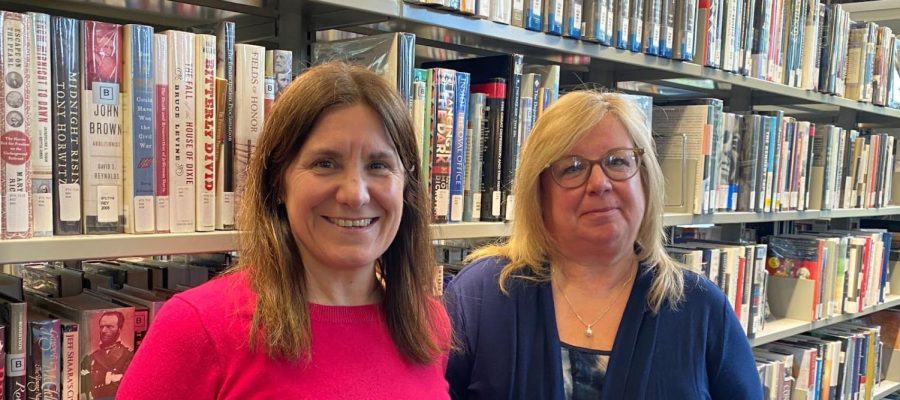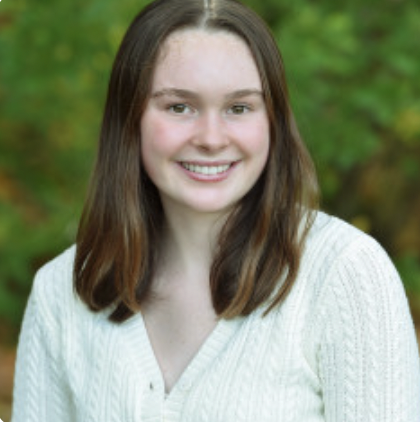An Interview with Mrs. Tuleja and Mrs. Pollock
May 29, 2023
Q: What led you to become a librarian?
Mrs. Tuleja: I was a history major undergrad at UMass, Amherst, where I realized I wanted to be an archivist. An archivist is someone who deals with letters and diaries in a manuscript library where you house original source material. I went to grad school, and then I worked at the Massachusetts Historical Society in Boston for ten years. I realized that everything I did well was with high school students and teachers, and so I applied for a job at Hotchkiss. All of a sudden, I became a boarding school librarian. I was both the archivist and the librarian in my independent school career. I’ve been at seven prep schools.
Q: What is your favorite aspect of being a librarian?
Mrs. Tuleja: The thing I do best is getting teenagers to go from a google brain to an academic brain and teaching them the skills needed to get to college and do college academic work. It’s my favorite thing. I love paying attention to all the legislative stuff as well.
Mrs. Pollock: I love working with kids and have worked in schools my entire life. I love the customer service aspect and just helping people. It’s fun!
Q: How long have you been at Berkshire? What attracted you to Berkshire? What did you do before Berkshire?
Mrs. Pollock: This is my eighth school year. It’s funny, I always wanted to work at Berkshire. I worked at Canterbury School previously. My son played sports and always played here. I always thought ‘what a beautiful school.’ I used to joke that ‘I am going to work there some day.’ When a job opened, I applied, and here I am.
Mrs. Tuleja: This is only my second year at Berkshire. I was off campus last year, and this year, I moved into Allen. I’m the house head in the ninth grade boys dorm. I am an ‘all-in boarding school person.’ Being on campus is really important to me. I have been at the really big schools, like Choate and Hotchkiss. But I was also at St. George’s previously; St. George’s is like the Berkshire of the ocean and Berkshire is of the mountain. They are very similar schools, where you can know everybody. It’s a good place to be. People get what I’m doing here. The teachers are collaborative and we partner together.
Mrs. Pollock: I love the community here. The library is such a beautiful space. It’s a pleasure to come to work.
Mrs. Tuleja: Also, the library is connected to the heart of the school. The link is only a hallway but that hallway is a main artery to the campus center and the dining hall that really makes a difference. At many other schools, the library is off on its own. It matters to teenagers what’s close. It’s an important piece to how we all stay connected.
Q: What is your favorite spot in the Berkshire library? Why?
Mrs. Pollock: I love the circulation desk, because I’m there a lot. It’s right in the center, in the hub of activity.
Mrs. Tuleja: The thing about this space is it’s flexible; when you walk in you can see people teaching and learning in several spaces. The flexibility of this space is really important. We are going to start dismantling some of the shelves so the space will become even more flexible.
Q: How has the digital world affected libraries?
Mrs. Tuleja: There are digitally-born kids who have never had to solely work in print. We have found that the academic university press books, where the research area of scholarship is, are now available digitally. Now that the quality of books on-line in a digital space is academic, I can teach digitally versus teaching print and digitally. I’m finding that the digital academic space is getting used more heavily than the print collection. It’s a rapidly changing landscape. It’s exciting but also daunting; you have to know what you are looking at on the screen. My job is to make sure you are paying attention to the types of sources you are using.
Q: Why should students come to do research in the library when there is so much material online? In other words, how can you help students in a way that the internet cannot?
Mrs. Tuleja: Customer service! We will do anything for anyone. We are here eight hours a day. No question is too silly. We do everything from printing to teaching to finding books.It’s the humans here at the library that matters. We do silly things like fixing the photocopier but we also talk to kids about breaking up with a boyfriend or girlfriend, or doing crappy on a test. A lot of kids gravitate here to talk. Humans matter in this space. When someone asks Mrs. Pollack or me a question, we don’t put it away. I don’t stop until I find an answer. That rabbit hole brain I have would be a very useful skill for every person to walk away with. When kids want to find something, they will find it. Last Bear Standing is happening right now, and that kind of energy is what I wish everyone felt about library skills. I want to meet with every student individually. Group instruction doesn’t work. Individually, little light bulbs go on. It gives people a pathway to move forward.
Q: Are there any changes you would like to see made regarding the library, the library’s website, or students’ usage/treatment of the library?
Mrs. Tuleja: This space is really used for academic purposes. This is a quiet study space but it is also a joyous space. People talk and interact. The idea of learning commons can be enhanced to have some programmatic pieces like having program leaders come to speak to students. I would love to see the physical space used in this way. The website also needs some work. As the stacks go away, there will be more space for flexibility. During the Benson rebuild, we will be able to use the library on week-ends.
Q: What are you reading now or what is the most recent book you read?
Mrs. Pollock: I am reading Hopeless by Colleen Hoover. I wanted to see what the kids were reading. Not quite my cup of tea, but it’s okay.
Mrs. Tuleja: I made a Tik Tok account to see what teenagers are reading. That’s how we got all the Hoover books at the library. I recently watched Sanditon on PBS, which is based on a Jane Austen book. I am reading that. I am a huge Jane Austen fan.
Q: How do you feel about the trend to ban books in public libraries and schools? Generally speaking, in what ways can students help preserve libraries across the country and help make sure that every book has a chance to be on the shelf?
Mrs. Tuleja: One person should not be able to tell everyone else they can’t read a book. The freedom to read and the freedom to dialog is the most important piece of our democracy. The idea that if one parent doesn’t want a book on a shelf, it is taken away from everyone, is something that really needs to be visible and discussed. We had a dialogue on campus about libraries being defunded and towns getting rid of libraries rather than having a particular book on the shelf. When I’m asked about texts in libraries that some people may find disturbing, I say I would not ban the book but if someone was taking it out in a way that made me feel uncomfortable, I would certainly report it. The answer is not to ban the book. In the end, I think the freedom to read will win. It’s important to stay vigilant and pay attention.
Mrs. Pollack: It’s important to talk about the books when teenagers read them.
Mrs. Tuleja: I think teenagers are the most important voices in these conversations because you will fight and push forward. That’s powerful. Fear drives some people so you have to figure out how to create space so that people can move beyond fear and see that we are all connected in some way.
Q: What is your all-time favorite book? Why?
Mrs. Tuleja: Pride and Prejudice [by Jane Austen]. I’ve read it ten times.
Mrs. Pollack: It is really hard for me to pick a favorite. One that I read many times was Mike Mulligan and His Steam Shovel by Virginia Lee Burton. It was my son’s all-time favorite book and we have read it so many times!! In fact, I even have a copy stashed away for when he has children some day. It always makes me happy to think about it!
Q: What book in the library should all students read before graduation? Why?
Mrs. Tuleja: Every student should read something from the school archives. It is good to know the history of the school.
Mrs. Pollack: You are the keepers of your time here at Berkshire and our hope is that when you are all alums you will give back and document the time you were here as students.
Q: In your opinion, what has been the most memorable all-school read? What should the next all-school read be? Why?
Mrs. Pollock: Station Eleven, because it was about a pandemic, prior to the pandemic.
Mrs. Taleja: I’m on the all-school read committee. The complexity of finding a book is hard because how do you find a book that reaches everyone? This coming year, I think it would be helpful to find a book that touches on our well-being. We’ve all been through so much. The idea of wellness and mental health is something we are trying to build back.
Mrs. Pollack: I like the idea of essays from all perspectives so everyone can relate to something.
Q: If you had a diner party, what three authors would you invite (living or dead)? Why?
Mrs. Taleja: Definitely Jane Austen and Henry James.
Mrs. Pollack: And John Steinbeck.
Mrs. Taleja: And Maya Angelo. What a good conversation that would be. I could actually give you lots of combos of authors.
Mrs. Pollack: It would be fun to mix contemporary with someone long gone.
Q: Aside from the library at Berkshire, what is your favorite library? Why?
Mrs. Taleja: I just did a pro vita trip to the Boston Athenaeum on Beacon Hill. We had so much fun there. It is such a beautiful space, plus the collection. A library is about comfort.
Mrs. Pollack: My favorite library would be my childhood library because I spent a lot of time there, with my sister and my father. That’s happiness to me.
*This interview has been edited and condensed for clarity.


